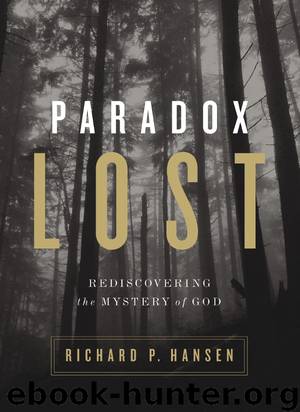Paradox Lost by Richard P. Hansen

Author:Richard P. Hansen
Language: eng
Format: epub
Publisher: Zondervan
Published: 2016-02-29T16:00:00+00:00
FIGURE 1
However, when we have a high view of human beings as the pinnacle of creation with whom God walked in the garden, this tends to correspond with a precipitously lower view of sin as the loss of this intimate relationship with God, resulting in humanity’s being warped away from God’s good creation in every conceivable way. Such a lower view consequently requires a much higher view of redemption to achieve the return of humanity to its former lofty position (dashed line). The much steeper lines in this scenario better correspond with the biblical view of humanity, which is both extremely high and extremely low. Just as our celebration of Easter depends on how deeply we comprehend and experience Good Friday, so our gratitude for our redemption in Christ seems to track with how deeply we comprehend these highs and lows of our humanity. When I understood that being a Christian was far different from being a “good boy,” I was ready to claim the redemption I had heard about occasionally in church but never thought I needed myself.
Finally, a fourth consequence of this “high/low” view of humanity is the ability to appreciate human culture without turning it into an idol. Some Christians focus so completely on the lows of human depravity that they are incapable of marveling at all that humanity has achieved. Yes, the church has always been corrupt, yet it has produced some of the most beautiful buildings, music, and art of the last thousand years. Yes, Isaiah is correct that “all our righteous acts are like filthy rags; we all shrivel up like a leaf, and like the wind our sins sweep us away” (Isa. 64:6). But in a well-intentioned effort to keep humanity in its place, we can miss the glory present in art, literature, music, science—indeed, any human endeavor.
Human achievements—whether by Christians or non-Christians—ultimately give glory back to the God who created us with the capacity for this creative self-transcendence. We create because we are made in the image of our Creator. When we understand our “high/low” paradoxical nature, we Christians, of all people, can most genuinely revel in the cultural achievements of our fellows yet still worship the God who planted the creative impulse within us.
Speaking of the human paradox, C. S. Lewis writes, “Our own composite existence is not the sheer anomaly it might seem to be, but a faint image of the Divine Incarnation itself—the same theme in a very minor key.”20 If Lewis is right, a great mystery is indeed afoot: humanity is a faint echo of the greatest paradox of all.
Download
This site does not store any files on its server. We only index and link to content provided by other sites. Please contact the content providers to delete copyright contents if any and email us, we'll remove relevant links or contents immediately.
The 5 Love Languages: The Secret to Love That Lasts by Gary Chapman(9809)
The Space Between by Michelle L. Teichman(6939)
Assassin’s Fate by Robin Hobb(6216)
Wiseguy by Nicholas Pileggi(5783)
Everything Happens for a Reason by Kate Bowler(4742)
Gerald's Game by Stephen King(4654)
Pillow Thoughts by Courtney Peppernell(4283)
A Simplified Life by Emily Ley(4161)
The Power of Positive Thinking by Norman Vincent Peale(4064)
Harry Potter and the Prisoner of Azkaban (Book 3) by J. K. Rowling(3359)
Resisting Happiness by Matthew Kelly(3341)
Girl, Wash Your Face by Rachel Hollis(3282)
Being Aware of Being Aware by Rupert Spira(3276)
The Secret Power of Speaking God's Word by Joyce Meyer(3218)
The Code Book by Simon Singh(3189)
More Language of Letting Go: 366 New Daily Meditations by Melody Beattie(3027)
Real Sex by Lauren F. Winner(3022)
Name Book, The: Over 10,000 Names--Their Meanings, Origins, and Spiritual Significance by Astoria Dorothy(2987)
The Holy Spirit by Billy Graham(2952)
